Learn about the intriguing interpretations of the 'Valley of Vision' in the Bible and uncover its deep spiritual significance.
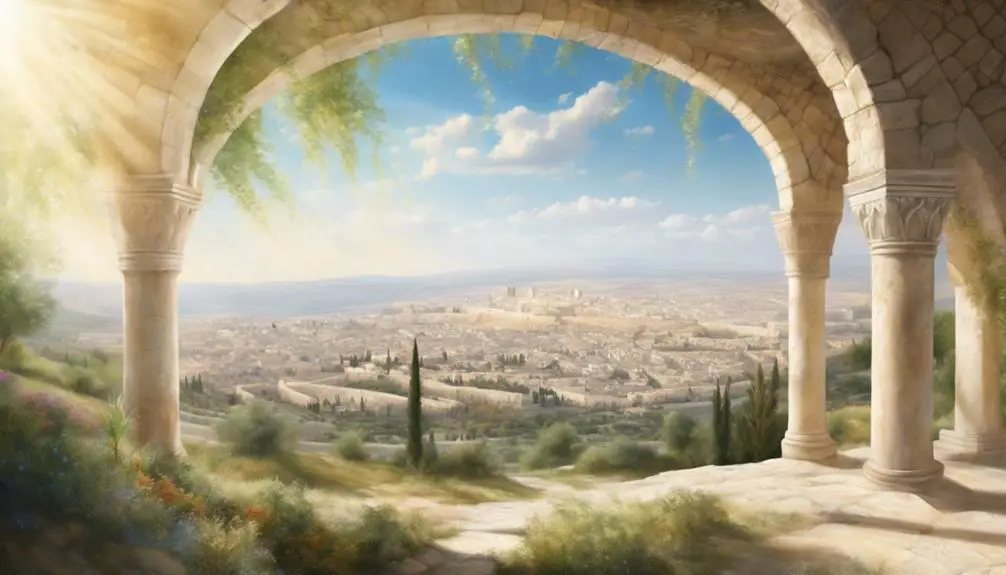
Valley of Vision in the Bible
Imagine standing on the edge of a vast valley, the 'Valley of Vision', as mentioned in the Bible. It's a place shrouded in deep spiritual significance, but what exactly does it represent?
You've probably come across this term while exploring the biblical text of Isaiah 22:1. But its interpretation isn't as straightforward as you might think. Theologians have long debated its meaning, offering various perspectives that could potentially change your understanding of this intriguing biblical concept.
So why not join this enlightening discussion and see what insights you might uncover?
Key Takeaways
- The 'Valley of Vision' symbolizes navigating life's challenges with divine guidance and spiritual growth.
- Its biblical roots lie in Isaiah 22:1, representing a place of contemplation and divine revelation.
- Theologians interpret it as spiritual insight, judgement, and a pathway to humility and maturity.
- Today, it offers a framework for understanding adversity, resilience, and spiritual development in contemporary life.
Origin of 'Valley of Vision
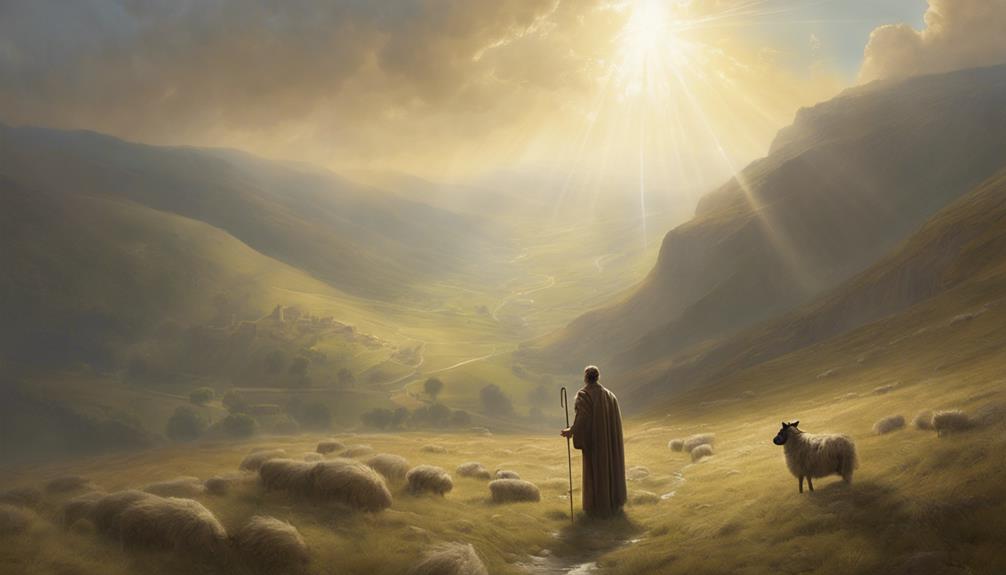
Diving into the origin of the 'Valley of Vision', you'll find its roots deeply embedded in biblical literature. The Valley's symbolism and the Vision's significance intertwine, creating a rich tapestry of meaning that has inspired countless interpretations.
The 'Valley' typically denotes a low point or a moment of trial, echoing life's inevitable challenges. However, it isn't a symbol of despair, but rather a representation of potential growth and transformation. You're reminded that valleys provide fertile ground for growth and that it's often in life's deepest trenches where resilience is nurtured.
Meanwhile, the 'Vision' carries immense weight. It signifies divine revelation or insight, implying a moment of profound understanding or spiritual awakening. It's not just an ordinary vision—it's a divine illumination that provides clarity amidst the darkness.
When combined, the 'Valley of Vision' symbolizes a spiritual journey, where the valleys of life offer opportunities for divine revelations. This phrase serves as a reminder that even in the depths of hardship, there's a potential for spiritual growth and enlightenment. It's a testament to the enduring human spirit that seeks wisdom and understanding, even in the most challenging circumstances.
Biblical Context and Verses
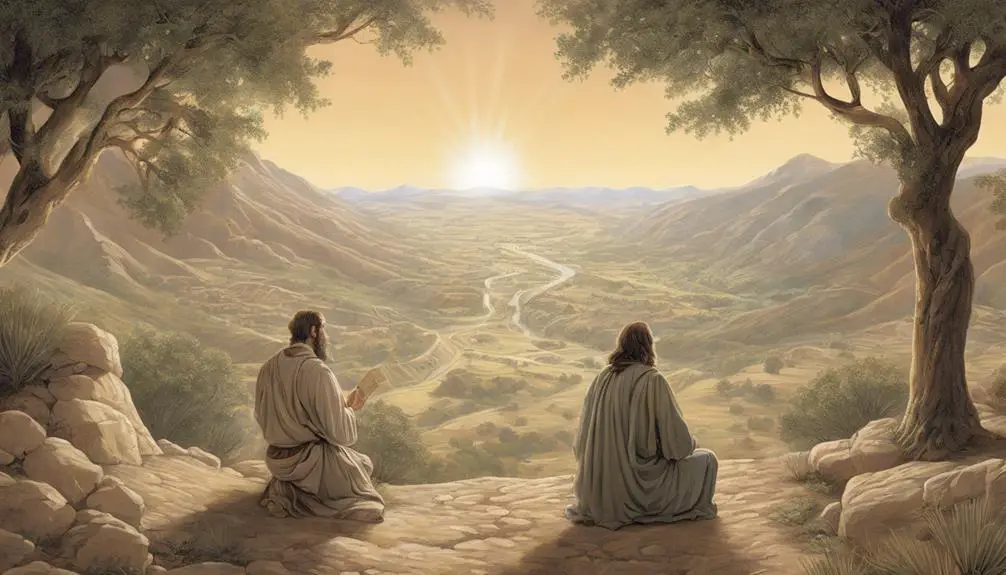
Now, turning to the biblical texts, we can further explore the instances and context where the term 'Valley of Vision' is used. The term is mentioned in the book of Isaiah 22:1. Symbolically, valleys in biblical landscapes often signify a place of deep contemplation or revelation, aligning with the vision symbolism.
Here's a brief table to provide a clearer understanding:
Verse |
Context |
|---|---|
Isaiah 22:1 |
A prophetic vision given to Isaiah about Jerusalem |
When considering the phrase within this context, it seems to signify a place where the divine revelation or 'vision' is given. However, the specific interpretation may vary based on the surrounding text and overall biblical narrative.
This exploration of the 'Valley of Vision' in the Bible helps you understand the potential symbolic significance of the term. However, to fully grasp its meaning, you must also consider other influential factors such as historical context and theological interpretations, which we'll delve into in the subsequent sections.
Interpretations by Theologians
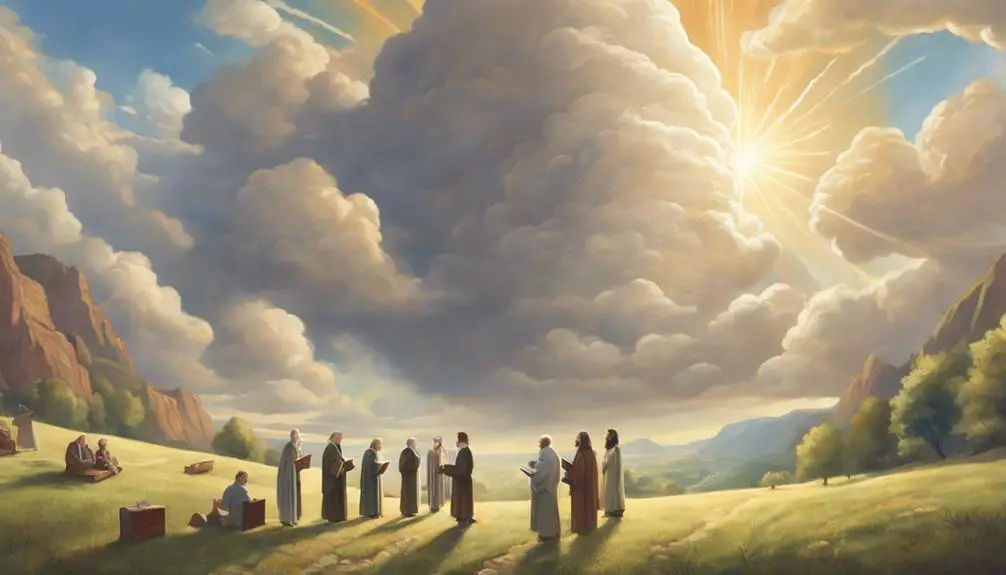
Turning to expert theological interpretations can offer a more nuanced understanding of the 'Valley of Vision' as depicted in the Bible. Theological debates have arisen due to differing perspectives on its symbolism and implications. Let's delve into these debates and consider some of the main interpretations:
- Some theologians see the 'Valley of Vision' as a metaphor for spiritual insight or enlightenment. They argue that it represents a place of revelation where God's truth is made clear.
- Others interpret it as a place of judgement or divine retribution, often citing its mention in the prophetic books of the Bible.
- There's also a school of thought that considers it a symbol of humility and contrition, a lowly place where one seeks God's mercy.
- A fourth interpretation views it as a place of prayer and spiritual communion, drawing from its use in hymnody and devotional literature.
- Finally, some theologians posit it as a representation of life's trials and tribulations, a valley experience that leads to spiritual growth.
These contrasting vision interpretations, while diverse, each add to our understanding of the 'Valley of Vision' and its multifaceted significance in biblical theology.
Spiritual Lessons Drawn

Building on these diverse interpretations, let's extract the spiritual lessons that the 'Valley of Vision' offers, particularly how it can shape your understanding and practice of faith. The Valley of Vision represents a place of Spiritual Enlightenment, a location where the mundane and divine intersect. The 'valley' symbolizes the trials and tribulations of life, while 'vision' represents the divine guidance that helps you navigate these challenges.
Drawing on this, you're invited to consider a Visionary Faith, one that perceives beyond immediate circumstances to discern God's hand at work. This implies a faith that isn't myopic, but rather expansive and cognizant of divine sovereignty even in the valley experience. It suggests that faith isn't a passive acceptance of fate, but an active engagement with divine possibilities.
Moreover, the Valley of Vision encourages you to find spiritual significance in the valleys of life, recognizing that often, enlightenment comes not from the mountaintops but from the depths. It teaches you to see beyond the temporary discomforts, to a place of spiritual growth and maturity. In essence, the 'Valley of Vision' provides a blueprint for navigating life's challenges with faith, resilience, and divine guidance.
Valley of Vision' Today
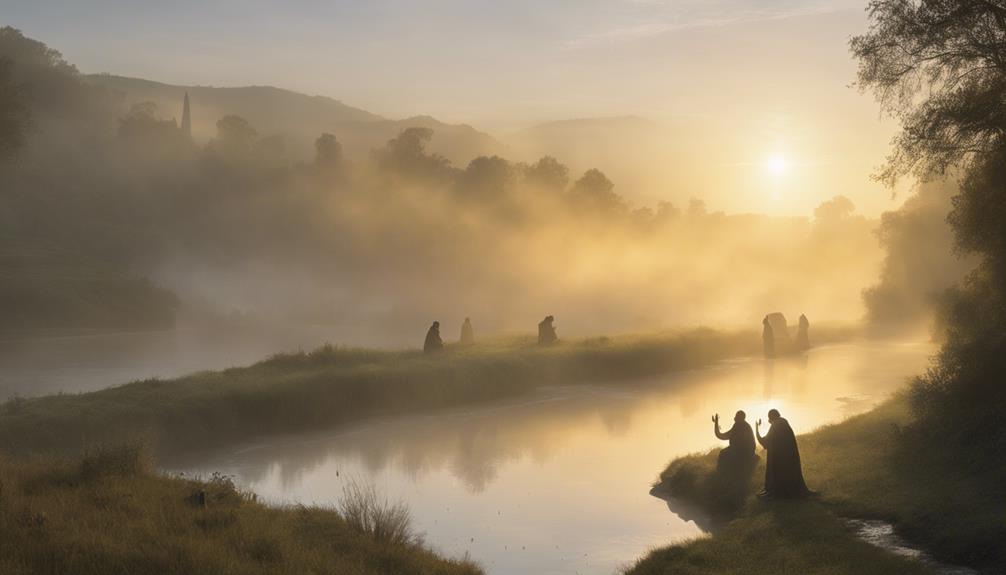
In today's world, the concept of the 'Valley of Vision' holds profound relevance, offering a framework for understanding and navigating the complexities of modern life. This biblical metaphor contains rich modern symbolism and can have profound personal applications.
Let's delve into how you can interpret the 'Valley of Vision' in your life today:
- Personal introspection: Just as the valley serves as a place of reflection in the Bible, it could represent a phase of deeper self-examination in your life.
- Overcoming adversity: The valley's challenging terrain stands as a symbol of the struggles you encounter and the resilience you display in overcoming them.
- Spiritual growth: Your journey through the valley could symbolize a period of spiritual growth, where you engage with your faith on a deeper level.
- Guidance: The vision in the valley might represent divine guidance, helping you navigate through the complexities of modern life.
- Hope and restoration: Emerging from the valley signifies a renewal of hope and restoration, mirroring the Bible's promise of restoration after a period of hardship.
Therefore, the 'Valley of Vision' remains a potent symbol in today's world, facilitating a deeper understanding of personal and spiritual experiences.
Frequently Asked Questions
How Does the 'Valley of Vision' Concept Relate to Other Religious Texts Outside the Bible?
You're exploring the concept of 'vision interpretation' in comparative theology. Outside the Bible, this notion is prevalent too.
For instance, in Buddhism, visions during meditation can offer profound insights. Similarly, in Hindu texts, visions often serve as divine messages.
Are There Any Controversies or Disagreements Among Scholars Regarding the 'Valley of Vision'?
Yes, there are controversies among scholars regarding the 'Valley of Vision'. Various interpretations exist, and these Valley Interpretations often differ based on the Canonical Context.
You'll find that some scholars argue for a literal interpretation, while others lean towards a symbolic or metaphorical one.
It's essential to critically evaluate each interpretation and understand the differing scholarly perspectives to fully grasp this concept.
How Does the 'Valley of Vision' Tie Into the Overall Narrative of the Bible?
You're exploring the prophetic significance and spiritual symbolism within the Bible's narrative.
It's essential to understand that different elements often carry symbolic meanings that tie into the larger story.
These symbols are often used to convey deeper truths, reinforce themes, and provide insights into the prophetic nature of the text.
However, without specific context, it's challenging to pinpoint the exact role of any given symbol.
How Can the 'Valley of Vision' Be Related to Modern Psychological Concepts?
You can relate the 'valley of vision' to modern psychological concepts through vision interpretation and psychological symbolism. It's like navigating your subconscious, exploring deep-seated ideas and emotions.
It's a journey to self-understanding, reflection, and personal growth. Just as a valley can symbolize challenges or transitions, a vision represents insight or revelation.
Thus, the 'valley of vision' serves as a metaphor for psychological exploration and self-discovery.
Are There Any Popular Culture References or Adaptations of the 'Valley of Vision' Concept?
You might find references to 'Valley of Vision' in literature and music, though they're not always directly linked to the biblical concept.
In literature, some authors use this metaphor to depict a journey of self-discovery.
Musically, it's been used as song or album titles, symbolizing a place of deep introspection.
It's interpreted diversely across cultures, but the common thread is the idea of 'vision valley' as a metaphorical space for revelation and transformation.
Conclusion
In conclusion, you've journeyed through the 'Valley of Vision', understanding its biblical origins, scriptural context, and theological interpretations.
You've explored spiritual lessons drawn from this valley and seen its relevance today. This journey isn't just about a geographical location, but a spiritual metaphor for personal reflection and transformation.
Remember, the 'Valley of Vision' is a journey everyone embarks on, shaping your spiritual growth and relationship with God.



Sign up